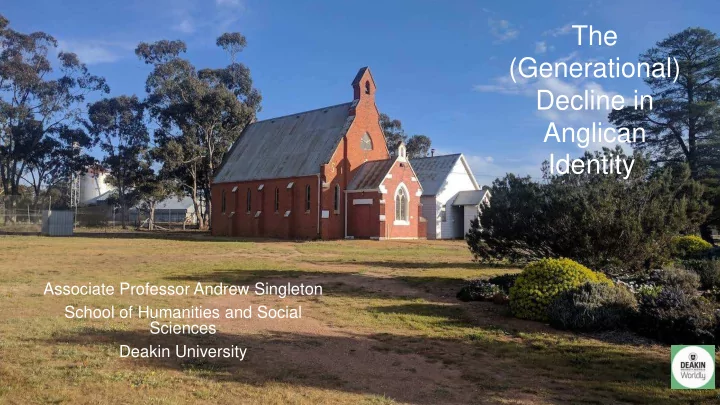

The (Generational) Decline in Anglican Identity Associate Professor Andrew Singleton School of Humanities and Social Sciences Deakin University
CEBS: Church of England Boys Society
This project: • Explores the loss of those who identify as Anglicans (or once might have identified as Anglican) • Empirical: quantitative and quantitative • The quantitative data are drawn from Australian Bureau of Statistics Census data from 1981 through to 2016. [Paper also makes use of the 2009 Australian Survey of Social Attitudes (AuSSA), the 2014 Household, Income and Labour Dynamics in Australia Survey (HILDA) and the Gallup poll from 1961] • Qual. data: 40 face-to-face interviews (23 current; 17 former Anglicans) • States & Territories in sample: Vic; NSW; QLD; WA; SA; ACT
Today • Explore the change and loss; • Discuss the causes of this loss; • However, the report covers more things …
Anglican Change 1981-1996
Change is ‘Generational’ in Character … • The name of each generation is taken from the ABS • The ‘Oldest’ are quite simply Australia’s oldest people (b. 1922-1931) • The ‘Lucky’ generation are those too young to have been conscripted to serve in any of the major wars of the twentieth century (b. 1932-1946) • Baby Boomers (b. 1947- 1966) • Generation X is a commonly used moniker for those who missed out on the epic social changes of the 1960s (b. 1967-1981) • Generation Y have followed after the Xers (b. 1982- 1996)
Change is affected by ‘Generation’ …
Rapid loss – 2011 to 2016
Anne: Lucky Generation ‘rusted-on’ Anglican • “The football finished on Saturday evening, we used to come home from football, buy fish and chips, and Sunday, for example, we’d just, we’d go for a long walk maybe and do the gardening, I don’t think there was, I don’t know what we did. We didn’t do anything on a Sunday” • “There was a huge group of young adults and we used to go for afternoon tea I think half past four, do a Bible study, have afternoon tea, go to church in the evening, and then go down to the coffee shop. We put on a fabulous play, we did Oklahoma and … we had this huge [production], particularly because we had a couple of really good singers, and very good musicians, yeah, we absolutely loved it … there was sport coming out of the church as well.”
Frankie: Boomer Wild Child • “I started getting into drugs and things like that … [I have taken] quite a number of illicit substances over my time and … had some very interesting, what I would term spiritual experiences as a result of those experiments with drugs like LSD, ketamine, things like that, cocaine, I tend to look at things like that as being able to access areas of your unconscious mind”
Jack: Lost Generation Xer • “There was never any pressure at all [from his parents] they understood when I had to stop going to church because junior cricket was playing on a Sunday morning, so there was no pressure to stay in the church, I’m sure there’s a little part of my parents now that are a little bit disappointed that I’m not involved in a formal or organised capacity with any church but that’s my generation.”
Summary of key findings • For many interrelated cultural and familial reasons, the Church has seen its constituency grow smaller with every passing decade. • People who would have once been Anglicans instead experience a disconnect from the organisation that represented their forbears, even if that organisation is changing. • It is also true that the prospective constituency has shrunk somewhat in recent decades, in an increasingly diverse society. • Other mainline denominations have experienced a similar trajectory; except the Catholic Church. • Identity closely aligned to an Anglican parish, community or theology, rather than the broader communion. • Re-imagining ‘being Anglican’ … • A denomination characterised now by diverse theological and cultural traditions, but bonded together (though not bound) by a rich and storied past
Recommend
More recommend